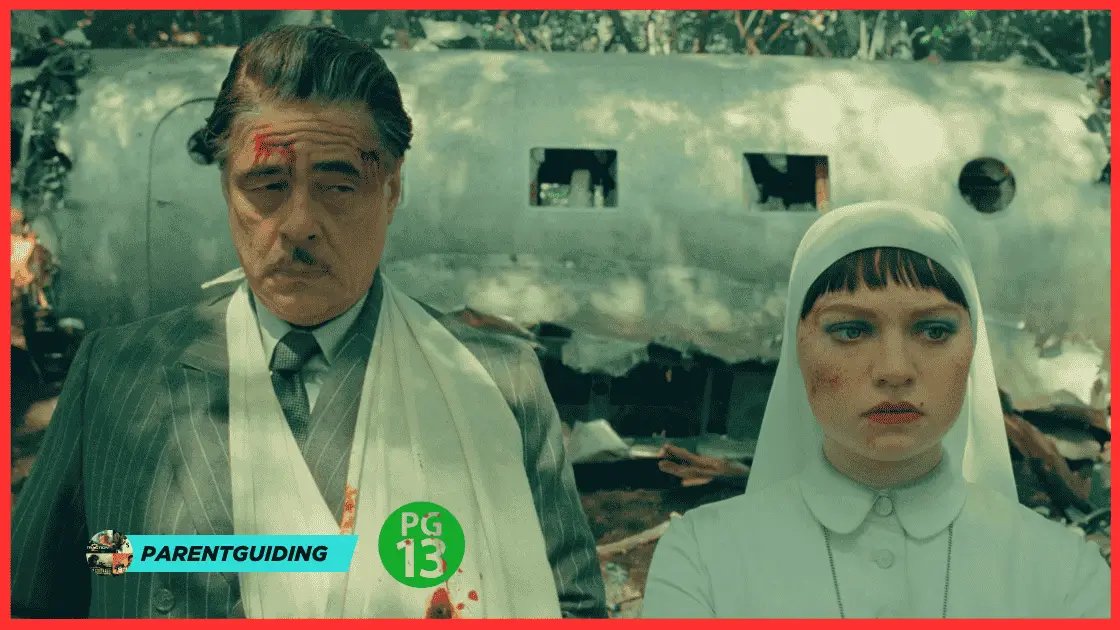The Phoenician Scheme Rated PG-13 by the Motion Picture Rating (MPA) for violent content, bloody images, some sexual material, nude images, and smoking throughout.
The Phoenician Scheme Review”: As Told by Korda
You know, I used to believe I was invincible.
Maybe it was the money. Maybe it was surviving three assassination attempts before breakfast. Or maybe I was just arrogant — a side effect of owning half the shipping ports on the Mediterranean. But whatever spell I was under, it ended the moment my private jet exploded at 30,000 feet and deposited me — or most of me — into a cornfield outside Marseille.
I shouldn’t have survived. My stomach was in ribbons, my leg a cocktail of bone and regret. And yet, somehow, there I was. Alive. Sort of.
They say near-death changes a man. In my case, it clarified something: I was running out of time, and I had one last empire to build — one final glorious gamble before the curtain dropped.
They called it The Phoenician Scheme. I called it destiny.
The Scheme
Phoenicia isn’t on most maps. That’s on purpose. Tucked between nations that pretend it doesn’t exist, it’s a land rich with copper, coastline, and confusion. No government to speak of, no infrastructure, and more natural gas than it knows what to do with. Perfect for a man like me — a fixer, a dreamer, a capitalist with a God complex and a dwindling pulse.
The idea was simple: secure private contracts with various power players, convince a few rulers that roads and desalination plants were worth more than revolution, and establish a self-regulated economic zone — a “golden pipeline,” I called it. All legal. Mostly.
But I needed help. Which is how I found myself standing at the gates of a convent in Zurich, bleeding through a linen vest, asking my estranged daughter to join me on what was, essentially, a morally ambiguous treasure hunt.
Liesel
Liesel didn’t hug me. Didn’t even flinch. Just narrowed her eyes and asked, “Is it true you poisoned my mother?”
I told her no. That I loved her mother. That I was sorry. All of which was true — and none of which answered the question.
She agreed to come with me. Not because she believed me, but because, I think, part of her wanted to see what kind of man I’d become. Or maybe she wanted to stop me. Or maybe she just needed closure before taking her vows.
She was twenty-one, wore combat boots under her habit, and could quote Thomas Aquinas while stitching up a gunshot wound. Her silence was more damning than any accusation.
Bjorn came, too. My science tutor from Oslo — a delicate man with a passion for quantum mechanics and a terrible poker face. He had no reason to be there, other than curiosity. Which, in hindsight, made him the bravest of us all.
The Odyssey Begins
We set off with a map and a shoebox full of laminated contracts. The plan was divided into phases, each represented by a color-coded compartment in the shoebox. My secretary, rest in peace, had organized it like a Japanese bento box for tycoons.
First stop: Prince Farouk. He ran the coastal refineries in Phoenicia and smelled like sandalwood and suspicion. He invited us to a dinner with thirty courses and didn’t eat a bite. Instead, he handed me a hand grenade wrapped in velvet and asked what I’d trade for stability. I told him: “One well-paved road and a school for girls.” He laughed for ten minutes. We left with his signature.
Then came Reagan and Leland — American diplomats with bad suits and worse intentions. They didn’t want paperwork. They wanted basketball. Apparently, they’d been watching White Men Can’t Jump on repeat. So we played HORSE, right there on a cracked court behind the embassy, with Farouk acting as referee. I lost the game. Liesel made the winning shot. It earned us a clause in the treaty about mineral rights. And a story I’ll never forget.
Complications
But every step forward brought danger.
Communist insurgents tried to blow us up in a jungle valley. One of them recognized me — said his village disappeared after I built a dam in 1938. I offered him a job. He declined.
We got lost in the jungle for three days. Bjorn almost died of dehydration. I hallucinated a conversation with Bill Murray dressed as Saint Peter, who told me I had a 12% chance of redemption. I asked if that included compound interest. He did not laugh.
Liesel saved us, guiding us out using an old monastery map she remembered from her studies. That was the moment I saw it — not just the resemblance to her mother, but her strength. She was more than I’d ever been. And that terrified me.
The Endgame
We reached Uncle Nubar last. My old rival. A financier with a taste for antique weaponry and double-crosses. He offered to “cover the gap” in my investment — a sum large enough to rebuild Florence — if I gave him naming rights to the entire capital city.
I considered it. Then declined.
That night, he sent an assassin to our hotel. Liesel killed the man with a curtain rod. She didn’t speak for the rest of the night. Neither did I.
And Then… Nothing
There’s no climax to this story. No fiery showdown or thunderous revelation.
The Scheme… dissolved. Deals unraveled. The world moved on.
Liesel left without a goodbye. Bjorn went back to Oslo and teaches now. Farouk was overthrown. Nubar disappeared. I heard the basketball court got turned into a fish market.
As for me? I sit alone in a tower I built from oil money and bad apologies, staring at the sea and wondering if the Biblical Troupe was right — if I’m just a man who took too much and left too little behind.
But sometimes, when I walk through the marble atrium of the Phoenician Trade Commission, I see Liesel’s signature on the foundation charter. One page she signed before she vanished. One tiny, stubborn act of belief.
And I wonder if, in some strange, sideways way, that’s what redemption looks like. Not a triumph. Just a trace.
Just… survival.
The Phoenician Scheme 2025 Parents Guide
Violence & Gore: The film contains multiple instances of gunfire, explosions, and hand-to-hand combat. While not gratuitous, the violence is portrayed stylized but impactful, consistent with Wes Anderson’s artistic tone.
The protagonist survives a private jet explosion — brief but intense — with a bloody, graphic description of injuries (e.g. “stomach in ribbons”).
A female character kills an assassin with a curtain rod in a tense hotel confrontation. Blood is implied but not lingered on.
Communist insurgents attempt to blow up the group in a jungle ambush. Gunfire and implied fatalities are involved.
Flashbacks and dialogue refer to war crimes, dam-induced village destruction, and off-screen political upheaval.
Bloody images are referenced in monologues, especially describing injuries and hallucinations.
Profanity: Language is moderate, with occasional use of “hell,” “damn,” “bastard,” and possible one or two non-sexual F-words, which aligns with a typical PG-13 threshold.
Sarcastic and biting dialogue is frequent, though profanity is not excessive.
Sex & Nudity: Mature themes such as betrayal, infidelity, and estranged family relationships are central to the plot.
There are brief references to past sexual relationships, including the suggestion that the protagonist may have poisoned his lover (Liesel’s mother).
A brief, artistic nude image is shown in the form of a classical painting or flashback photograph — non-sexual in context.
A satirical “thirty-course dinner” scene may include mildly suggestive conversation, but nothing overt.
Alcohol, Drugs & Smoking: Cigarette smoking is frequent among characters, particularly during negotiations and reflective scenes.
Characters drink alcohol at dinners, diplomatic events, and embassies.
A hallucinatory sequence features the main character under severe dehydration, imagining Bill Murray as Saint Peter in a surreal conversation — no drugs involved, but the scene may be confusing for younger viewers.
The overall tone is reflective and somber, with moments of darkness that may be unsettling for children under 13.
Director: Wes Anderson
Writers: Wes Anderson, Roman Coppola
Starring: Bill Murray, Benicio del Toro, Michael Cera, Tom Hanks, and Scarlett Johansson
Release Date: June, 6 2025

I am a journalist with 10+ years of experience, specializing in family-friendly film reviews.
